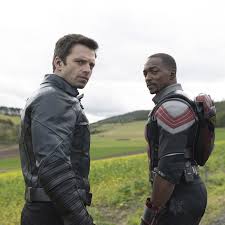By Prabhnoor Singh
Days after the world exhaled in relief as Derek Chauvin was found guilty of murdering George Floyd, Marvel undraped Anthony Mackie’s Sam Wilson because the new Captain America — within the method, creating a poignant argument for why a Black hero would rise to defend a country that usually mistreats people that look like him.
The reveal came throughout the ultimate episode of The Falcon and therefore the Winter Soldier, a Disney+ series that mixed splashy fight scenes and disappointing cameos from underused Marvel characters with weighty talk about the nature of heroism.
The consequence of the reveal was underscored by a new series title flashed at the end of the season finale: Captain America and the Winter Soldier. As any real superhero fan knows, the original Captain America — Chris Evans’ blue-eyed dreamboat Steve Rogers — decided to return to the 1940s and live out his life as a normal man at the end of Avengers: Endgame. Rogers’ last act in that movie was to hand his legendary shield over to Sam Wilson as an old man, encouraging his former sidekick to continue its heroic legacy.
But having a Black man step up to be a symbol of America at a time when police brutality and systemic racism are front-page issues couldn’t be a simple matter.
Even though the first season of The Falcon and the Winter Soldier focused on a complicated plot about super-powered freedom fighters becoming terrorists, the real purpose was to spend six episodes transforming the Falcon. We watched him become a Black hero who could shoulder Captain America’s red-white-and-blue Vibranium shield, fully aware of all the issues he was taking on.
“Every time I pick this thing up, I know there are millions of people out there who are going to hate me for it,” Wilson says in one poignant speech in the season finale. “Yet I’m still here. No super serum. No blond hair or blue eyes. The only power I have, is to believe we can do better.” At a time when average people are risking their safety to protest police brutality, putting so much on the line for the belief that America can be made better by the hard work of earnest people, that kind of speech feels like a rallying cry.
This series outside of Sam Wilson’s storylines felt so underdeveloped, especially the supposed bad guys, terrorist/freedom fighters, the Flag Smashers. These were average people who had taken a substance similar to the “super-soldier serum” which gave the original Captain America his increased speed, stamina, and strength.
Suffice it to say, these villains were so average, they added little beyond motivation for Wilson’s Falcon and Sebastian Stan’s Winter Soldier to bond. The Flag Smashers also gave a reason for the heroes to tap the expertise of a villain dedicated to killing anyone who takes a super-soldier serum, Daniel Bruhl’s Baron Zemo.
Marvel’s superhero movies have always been careful about how each hero’s power stacks up against others, even across movies. So it always irritated me a bit that these Flag Smashers, who are essentially average – if desperate – folks given great speed and strength from a serum, could successfully take on the Winter Soldier, a highly trained assassin with matching speed and strength, a Vibranium arm and who fought the original Captain America to a draw several times. OK. I feel better now.
In the end, The Falcon and The Winter Soldier is an earnest, thoughtful, and politically charged story that skillfully explores racism and legacy in a manner perfectly attuned to the the style of the MCU. Along with Wandavision, Disney+ is a place for more challenging experiments. While the MCU’s exploration of the legacy of Steve Rogers and Captain America is destined to be remembered, its many other plotlines and character arcs suffer from a lack of space and detail. The show accomplished a thrilling tale of heroism and spycraft. It would be higher on my list if they didn’t miss the opportunity to call it Captain America and the White Wolf.

